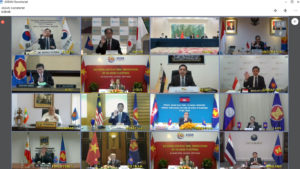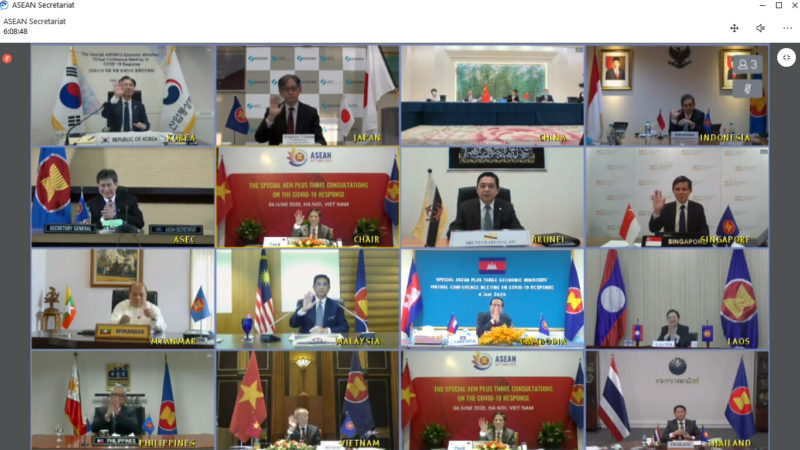
Economic ministers of the Association of South East Asian Nations (ASEAN), China, Japan, and South Korea have reaffirmed the need to keep markets open for trade and investment to strengthen resiliency and sustainability of regional supply chains and maintain flow of goods and services.
Consistent with the rights and obligations under the World Trade Organization (WTO) covered agreements, the economic ministers in a joint statement after the recent ASEAN Plus Three virtual meeting agreed to refrain from taking unnecessary measures that may affect the smooth flow of essential goods such as food, commodities, medicines and medical supplies in the region. They also agreed to notify all trade-restrictive measures in compliance with existing WTO rules.
The ministers acknowledge the urgent need for intensified and concerted efforts to address the adverse impact of the coronavirus disease (COVID-19) pandemic on their people, including economic disruptions that have affected regional supply chains, the financial markets, and human capital.
The ministers expressed their commitment to ensure the continued flow of trade in goods and services, especially for essential goods and services.
They also agreed to continue addressing non-tariff barriers, especially those that impede the smooth flow of goods and services in supply chains.
Trade facilitation measures
In line with objectives to combat the COVID-19 pandemic, economic ministers said they will ensure that measures restricting cross-border movement of goods and services deemed necessary for public health emergency response will be targeted, proportionate, transparent, temporary, and consistent with the WTO rules so as not to unnecessarily restrict trade within the region.
The ministers encourage close coordination, especially among the Customs agencies, to continue promoting trade facilitation measures, especially at land borders, taking into account the standards and recommendations of the World Customs Organization (WCO) and the provisions of the WTO Trade Facilitation Agreement.
Economic ministers said they will keep working closely with all partners in the global and regional supply chains to accelerate relevant procedures at the border to facilitate and promote development of cross-border trade.
The ministers also encourage pursuit of facilitative measures that will expedite economic rebound from this crisis.
They also highlighted support to businesses, particularly the micro, small and medium enterprises (MSMEs) and the vulnerable economic sectors. They encourage them to make use of the digital economy and technologies to allow them to continue operations and repurpose their capacities to meet new needs amid the COVID-19 pandemic.
The economic ministers support the facilitation of essential movement of business people across borders and cross-border transfer of information and data by electronic means for the development of the digital economy.
The economic ministers have tasked officials to identify and pursue initiatives, such as the Joint Study on 10+3 Cooperation for Improvement of Supply Chain Connectivity (SCC) under the existing ASEAN Plus Three framework, to strengthen joint efforts toward post-pandemic recovery in the region, stabilize manufacturing and supply chains of goods and services towards improving stability and resilience of the regional economy, restore growth and connectivity as well as to make them more resilient, sustainable and less vulnerable to future internal and external crises.
Economic ministers said they “remain committed to the signing of the Regional Comprehensive Economic Partnership (RCEP) Agreement in 2020, and working together to resolve India’s outstanding issues in a mutually satisfactory way, as mandated in the Joint Leaders’ Statement on the Regional Comprehensive Economic Partnership issued in 2019 as part of efforts to achieve a higher level of regional economic integration.”





